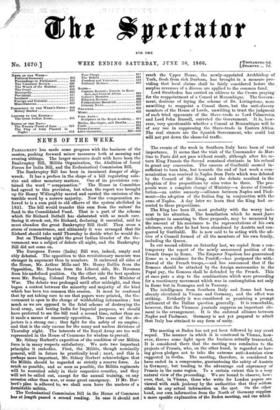NEWS OF THE WEEK.
Paatammir has made some progress with the business of the session, pushing forward minor measures both at morning and evening sittings. The larger measures dealt with have been the Bankruptcy Bill, Militia Organization, the Abolition of Local Forces for India Bill, and the Ecalesfastical Commission Bill.
The Bankruptcy Bill has been in imminent danger of ship- wreck. It has a preface in the shape of a bill regulating sala- ries and other monetary matters. One of its provisions con- tained the word " compensation." The House in Committee had agreed to this provision, but when the report was brought up Sir Henry Willoughby moved and carried the omission of the terrible word by a narrow majority. Now the compensation re- ferred to is a sum paid to old officers of the system abolished in 1831. The bill would transfer this sum from the suitors' fee fund to the Consolidated Fund. That is a part of the scheme which Sir Richard Bethell has elaborated with so much care. Seeing it struck out, Sir Richard, declaring it essential, said he must abandon the great Bankruptcy Bill itself. Then arose a storm of remonstrance, and ultimately it was arranged that Sir Richard should take until Thursday to decide what he would do.
But on Thursday night the great Indian blunder of the Go- vernment was a subject of debate all night, and the Bankruptcy Bill did not come on.
The European Forces (India) Bill .was, indeed, amply and ably debated. The opposition to this revolutionary measure was stronger in argument than in numbers. It embraced all sides of the House, Mr. Arthur Mills and Mr. Henry Baillie from the Opposition, Mr. Buxton from the Liberal side, Mr. Horsman from his undefined position. On the other side the best speakers were Mr; Baring, Colonel Percy Herbert, and the Minister of War. The debate was prolonged until after midnight, and then began a contest between the minority and majority of the kind which has been too common this session. It must be confessed that by not taking care to see that papers were printed, the Go- vernment is open to the charge of withholding information ; but much as we are opposed to the fatal scheme of destroying the local army, and taxing India for Imperial purposes, we should have preferred to see the bill read a second time, rather than see it made a means of unseemly opposition. The cause of the ob- jectors is, a strong one ; they fight for the safety of an empire ; and that is the only excuse for the many and useless divisions of Thursday night. The interests of the Royal Army are too well represented in the House of Commons for wisdom to prevail.
Mr. Sidney Herbert's exposition of the condition of our Militia force is in many respects satisfactory. We note two important principles it embodies. First, the Militia, though nominally general, will in future be practically local ; next, and this is perhaps more important, Mr. Sidney Herbert acknowledges that the Militia should be regarded as strictly a reserve force. As much as possible, and as soon as possible, the Militia regiments will be recruited solely in their respective counties, and they will not be called out, except for the annual training, on any occasion other than war, or some great emergency. If Mr. Her- bert's plan is adhered to, we shall soon have the nucleus of a formidable militia.
The Ecclesiastical Commission Bill in the House of Commons has at length passed a .seoond reading. In ease it ehetad not
reach the Upper House, the newly-appointed Archbishop of York, fresh from rich Durham, has brought in a measure pro- viding that local claims shall be fairly considered before the surplus revenues of a diocese are applied to the common fund.
Lord Stratheden has carried an address to the Crown praying' fot the reappointment of a Consul at Mozambique. The Govern- ment, desirous of trying the scheme of Dr. Livingstone, were unwilling to reappoint a Consul there, but the anti-slavery members of the House of Lords, unwilling to trust the judgment of such tried opponents of the Slave-trade as Lord Palmerston and Lord John Russell, outvoted the Government. It is, how- ever, very questionable whether a Consul at Mozambique will be of any use in suppressing the Slave-trade in Eastern Africa. The real sinners are the Spanish Government, who could but will not put down the shameful traffic.


























